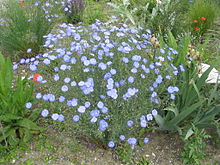Linum perenne, the perennial flax,[2] blue flax or lint, is a flowering plant in the family Linaceae, native to Europe, primarily in the Alps and locally in England. It has been introduced into North America, where it can be found on mountain ridges, wooded areas, and in sandy plain habitats of the sagebrush steppe, growing near sagebrush and rabbitbrush (Chrysothamnus).[3]
| Linum perenne | |
|---|---|

| |
| Scientific classification | |
| Kingdom: | Plantae |
| Clade: | Tracheophytes |
| Clade: | Angiosperms |
| Clade: | Eudicots |
| Clade: | Rosids |
| Order: | Malpighiales |
| Family: | Linaceae |
| Genus: | Linum |
| Species: | L. perenne
|
| Binomial name | |
| Linum perenne | |
| Synonyms[1] | |
| |
It is a slender herbaceous perennial plant growing to 90 centimetres (3 ft) tall from a fairly woody root crown, with tough, unbranched stems,[3] and many spirally arranged narrow lanceolate leaves 1–2.5 cm long. The flowers are blue, 2.5–5 cm (1–2 in) in diameter, and have five petals.[3] The flowers will fall off if the stems are broken.[3]
The English populations are sometimes distinguished as Linum perenne subsp. anglicum and high altitude populations in the Alps as Linum perenne subsp. alpinum. The similar western North American species Linum lewisii is sometimes treated as a subspecies of L. perenne.
Native Americans used the stems to make fishing line and nets.[3][dubious – discuss]
Cultivation
editCultivars for garden use include 'Blue Sapphire'.
References
edit- ^ "The Plant List: A Working List of All Plant Species". Retrieved 5 October 2014.
- ^ BSBI List 2007 (xls). Botanical Society of Britain and Ireland. Archived from the original (xls) on 2015-06-26. Retrieved 2014-10-17.
- ^ a b c d e Taylor, Ronald J. (1994) [1992]. Sagebrush Country: A Wildflower Sanctuary (rev. ed.). Missoula, MT: Mountain Press Pub. Co. p. 62. ISBN 0-87842-280-3. OCLC 25708726.
Further reading
edit- Blamey, M. & Grey-Wilson, C. (1989). Illustrated Flora of Britain and Northern Europe. Hodder & Stoughton.
- Huxley, A. (1992). New RHS Dictionary of Gardening vol. 3: 93. Macmillan.
- Linum perenne in the CalPhotos photo database, University of California, Berkeley
- "Linum perenne". Plants for a Future.